Lavrov Says Russia, Iran To take Steps To Circumvent Western Sanctions
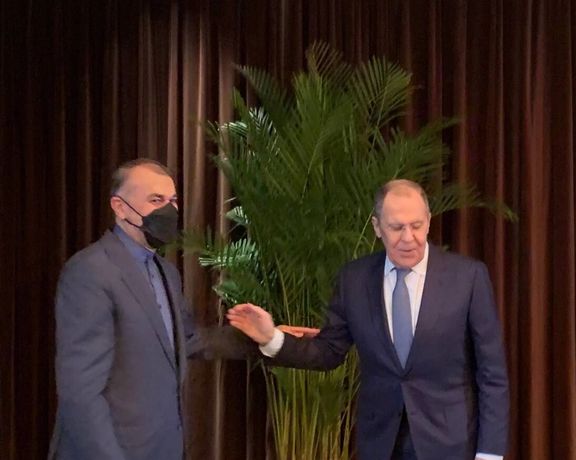
Russian Foreign Minister Sergei Lavrov said Wednesday Moscow would work with Iran to take steps to circumvent Western sanctions, the RIA news agency reported.

Russian Foreign Minister Sergei Lavrov said Wednesday Moscow would work with Iran to take steps to circumvent Western sanctions, the RIA news agency reported.
Lavrov's remarks came after he met with Iran's foreign minister Hossein Amir-Abdollahian in China on the sidelines of a multilateral meeting between Afghanistan's neighbors.
It was not immediately clear if he was referring to sanctions against Russia exclusively, or also those against Iran.
Lavrov's remark could throw another stumbling block to a nuclear agreement between Iran and the West to revive the Obama-era JCPOA.
Moscow made demands in mid-March to have its relations with Iran exempted from western sanctions imposed after the invasion of Ukraine. At the time, the demand complicated efforts to achieve a deal after 11 months of talks in Vienna.
In addition, Tehran wants the United States to remove its Revolutionary Guard (IRGC) from its list of terrorist groups. Washington has not accepted the demand but has reportedly said it would be contingent on Iran limiting its aggressive actions in the Middle East.
Iran has been highlighting its policy of relying on Russia and China for trade in the face of US sanctions. Iran’s envoy to Russia said last week the two countries are in talks over the possible recognition of the Russian payment system MIR. Iran is cur off from the international banking system SWIFT. Many Russia banks have also been sanctioned.
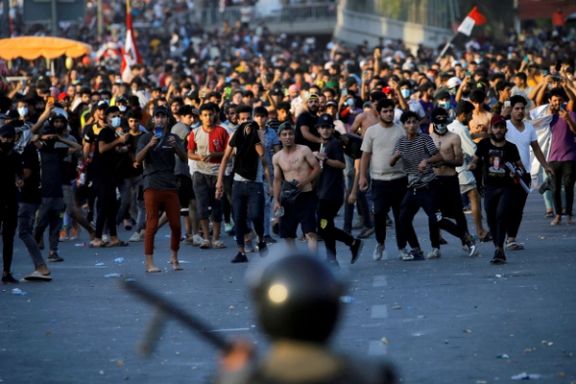
The United States has given another 120-day ‘waiver’ that rules out punitive action against Iraq for importing energy from Iran.
With temperatures in Baghdad already nearing 30 degrees Celsius, officials fear a repeat of last year’s widespread protests over electricity cuts.
“The waiver ensures that Iraq is able to meet its short-term energy needs while it takes steps to reduce its dependence on Iranian energy imports”, an official in the State Department wrote in a statement to Iraq Oil Report quoted Monday.
This is the latest waiver, and latest call from Washington for Iraq to generate its own electricity, since former President Donald Trump in 2018 withdrew from the 2015 Iran nuclear deal with world powers, Joint Comprehensive Plan of Action (JCPOA), and imposed ‘maximum pressure’ sanctions threatening to punish third parties dealing with Iran’s financial sector. Iraq’s leaders have called for renewal of the JCPOA.
Iraq’s electricity outages have increased after years of infrastructural damage in war, sabotage by the Islamic State group (Isis-Daesh), low rainfall reducing hydroelectricity, growing demand, and corruption. The Trump administration shortened its waiver from 120 days to 90 days to cajole Baghdad, but the Biden administration renewed it for 120 days last March, ahead of nuclear talks in Vienna that began April.
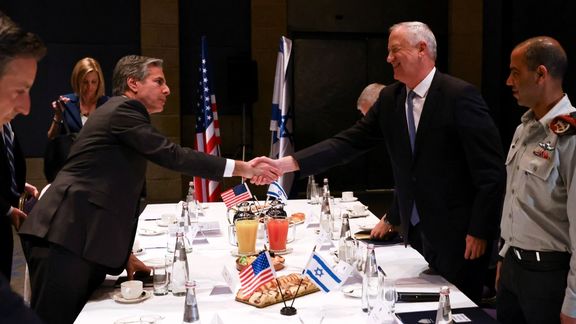
The US Secretary of State has tried to assure Israelis that Washington will work with Tel Aviv to deny Iran atomic weapons, with or without a nuclear deal.
The issue of removing Iran's elite Revolutionary Guards (IRGC) from the US list of Foreign Terrorist Organizations (FTO), which Iran now expressly says is a pre-condition to agreeing to the restoration of the 2015 nuclear deal, Joint Comprehensive Plan of Action (JCPOA) appears to be at the center of Arab foreign ministers in Tel Aviv.
The US Secretary of State, Antony Blinken, who is also participating in a two-day summit attended by foreign ministers of the United Arab Emirates, Egypt, Morocco, and Bahrain, tried to reassure Israeli and Arab partners of the United States on Sunday that Iran will not be allowed to build a nuclear bomb whether the JCPOA is restored or not.
The extraordinary summit of the Arab countries that have normalized their relations with Israel in the past eighteen months is hosted by Israel’s prime minister, Naftali Bennett.
“But whether there’s a deal or not, our commitment to the core principle of Iran never acquiring a nuclear weapon is unwavering. And one way or another, we will continue to coordinate closely with our Israeli partners on the way forward,” Blinken said at a joint press conference with Israel’s foreign minister, Yair Lapid. “We are both committed, both determined, that Iran will never acquire a nuclear weapon,” he said.
The US has also sought to reassure Israel and Arab countries that it would not surrender to Iran's demand over delisting of the IRGC whose involvement in regional politics and conflicts – including Yemen, Lebanon, Iraq, and Syria.
Us allies in the region have long been concerned over the Biden Administration policy of restoring the JCPOA in exchange for lifting crippling sanction the former US administration imposed on Iran.
“This is not a deal that is intended to resolve that issue. Many in the region view the IRGC in the same way we view them. I can tell you that the IRGC will remain sanctioned under US law, and our perceptions, our views, our policy towards the IRGC have not changed,” the US Special Representative for Iran, Robert Malley, said at the Doha Forum Saturday.
But in a meeting with the Lebanese Prime Minister, Najib Mikati, on the side-lines of the Doha Forum on Monday, Supreme Leader Ali Khamenei's advisor and former foreign minister Kamal Kharrazi insisted that the IRGC is its national army and the country's national army could not be listed as a terrorist group. “The real thing is that IRGC is very important for Iran, and they are not going to compromise on that,” he said.
Seattle-based professor and political commentator Jalil Roshandel told Iran International Monday that in his view, the US has decided to restore the JCPOA but is still not sure about Iran's demand to delist the IRGC. It appears that under the immense pressure of Congress and US allies in the Middle East, the Biden administration is now more inclined to reject the demand, he said.
Roshandel said concerns over Iran's activities in the region may incite the participants in the summit in Israel to strike a security deal. "All of this is pressure on Biden [to reject Iran's demand] … And Iran has not shown any signs to assure the West that the IRGC will not behave as before in regional conflicts and be more friendly even if it is delisted."
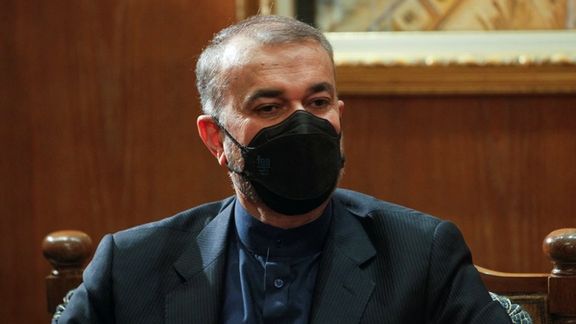
Iran’s foreign minister says he never suggested giving up Iran’s demand from the United States to remove the Revolutionary Guard (IRGC) from its terrorist list.
Hossein Amir-Abdollahina in an interview had said that IRGC commanders do not object if the government gives up its demand from the US to remove the military organization from its Foreign Terrorist Organization (FTO) list.
"I couldn't have spoken more clearly about the pivotal role of the honorable Revolutionary Guards," Hossein Amir-Abdollahian said in an Instagram post Sunday after an uproar about his remarks in a televised interview Saturday. "The issue is not compromising or making a concession over red lines. I suggest re-examination of my interview yesterday," he wrote.
Amir-Abdollahian's remarks Saturday were widely misunderstood by some media and pundits. Some thought he was declaring that the IRGC had given the green light to the government to make a concession in Vienna nuclear talks and not demand the removal of the IRGC from the US FTO list.
Iran International did report that the Iranian foreign minister was not suggesting a retreat from Tehran's demand in his Saturday remarks.
Amir-Abdollahian did claim on Saturday that senior Revolutionary Guard officials always tell the government that it should do whatever it deems necessary to secure the country's national interests and not to prioritize the issue of the IRGC and called it "self-sacrifice on the part of the IRGC". However, he added that despite having the "permission" from the IRGC, the government continues to consider its removal from the US list of terror organizations a "major issue" in the talks.
This was the first time Amir-Abdollahian clearly referred to IRGC terror listing as a main issue in the talks.
At the Doha Forum Sunday, the US Special Representative for Iran, Robert Malley, said he could not be confident a deal to restore the 2015 nuclear deal, Joint Comprehensive Plan of Action (JCPOA), is imminent.
“We haven’t decided to delist the IRGC. The sooner we get back into the deal -- we think it’s in our interest to be back in a deal and we think Iran’s too -- the more faithfully we can implement it.”
"This is a nuclear deal, we’re lifting those sanctions. It’s not intending to address other issues like Iran’s regional policy and other sanctions," Malley said.
Former foreign minister and Supreme Leader Ali Khamenei’s senior advisor Kamal Kharrazi told the Doha Forum on Sunday that a nuclear deal between Iran and world powers was imminent but insisted that a deal was possible only if US showed "political will" and removed the IRGC from its FTO list. "IRGC is a national army, so its being listed as a terror group is not acceptable," he said.
The misinterpretation, or imprecise quotation, of Amir-Abdollahian's Saturday remarks caused scathing criticism from some hardliners in Iran. The ultra-hardliner chief editor of Kayhan newspaper, Hossein Shariatmadari, harshly attacked Amir-Abdollahian although his remarks were clear enough that the demand to delist the IRGC was still on the table. Shariatmadari, appointed by Supreme Leader Ali Khamenei, said to forgo the IRGC delisting was "surrender", not "sacrifice".
The ultra-hardliner called the foreign minister's remarks "very odd and unexpected". "These remarks could suggest that Iran's foreign minister is not blessed with the adequate and necessary command of current affairs in his domain of responsibility," he wrote and urged IRGC commanders to correct the foreign minister's remarks by offering a "candid and quick explanation.
In an editorial note in January Shariatmadari berated Amir-Abdollahian, as well as the Secretary of the Supreme National Security Council Ali Shamkhani, when they hinted at the possibility of direct talks with the United States. Shamkhani, according to Kayhan, backed down from his position but Amir-Abdollahian did not respond to the criticism.
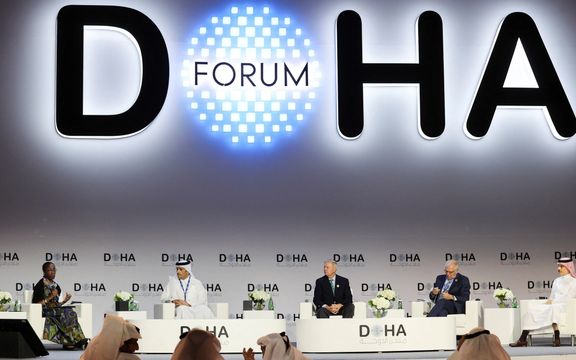
More than two weeks after Iran’s nuclear talks in Vienna came to a halt, Tehran sounds more optimistic about the eventual outcome than the Biden Administration.
A senior advisor to Iran's Supreme Leader said on Sunday that a nuclear deal between Tehran and world powers was imminent but could only happen if the United States showed political will.
"Yes, it's imminent. It depends on the political view of the United States," Kamal Kharrazi said at the Doha Forum international conference.
Kharrazi said it was vital for Washington to remove the foreign terrorist organization (FTO) designation against its Islamic Revolutionary Guard Corps (IRGC).
"IRGC is a national army and a national army being listed as a terrorist group certainly is not acceptable," he said.
The Biden Administration has hesitated over the issue, possibly because of its domestic backlash. If the administration takes such a step and days or weeks later the IRGC or its militant proxies in the region attack a country, President Joe Biden will be held responsible and blamed for being soft on Iran and miscalculating Tehran's intentions.
There are plenty of recent examples of Iranian aggressions. The IRGC lobbed 12 ballistic missiles at Erbil, in Iraqi Kurdistan this month claiming it targeted a secret Israeli base there. Houthi rebels armed and trained by IRGC attacked Saudi oil installations on Friday causing large fires.
Removing the biggest cross-border military, intelligence group controlling dozens of militant groups in the region from a terror list does not guarantee they will change their behavior. On the contrary, critics say such a move will embolden them.
Already, bipartisan opposition is growing against the Vienna talks, especially any notion of removing the IRGC from the US terrorist designation.
After 11 months of negotiations with Iran, the Biden Administration now finds itself caught between the hammer and the anvil and has become more cautious about the possible outcome of the talks.
US Special Envoy for Iran Robert Malley attending the Doha conference said that he is not confident a nuclear deal between Western powers and Iran is imminent.
"The sooner we get back into the deal, which is in our interest, and presumably Iran's interest, the more faithfully we implement it, and the more we can build on it to address the other issues between us and Iran and between Iran and the region," Malley said on Sunday.
He also made clear that the United States is negotiating to revive the 2015 nuclear agreement, and this is not “intending to address other issues” like Iran’s regional policy and other sanctions – a possible reference to Tehran’s demand over IRGC’s terror sanctions.
When former president Donald Trump withdrew from the JCPOA in 2018, his administration imposed nearly 1,500 sanctions until the very end of his presidency. The most painful economic sanctions are related to Iran’s nuclear program and will be lifted if the agreement is revived. But the US has consistently said terrorism, human rights and other sanctions will not be lifted. Iran, on the other hand, has always demanded the removal of all sanctions.
The US hopes to use the remainder to negotiate with Tehran over its aggressive regional policies and ballistic missile program. However, critics have been saying that once Iran is free of the major economic sanctions, it would have little incentive to moderate its behavior or make concession over the missile issue.
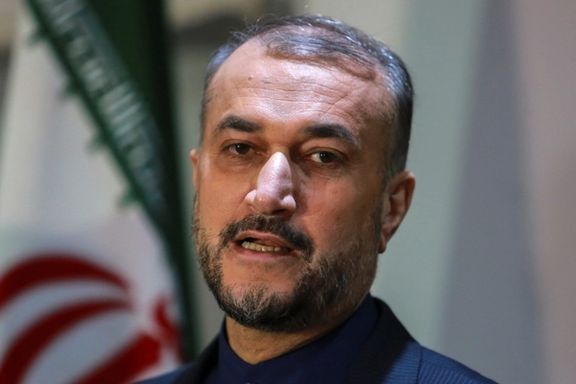
Iran's foreign minister on Saturday said removing the Revolutionary Guard (IRGC) from the list of US sanctions is one of the main issues in nuclear talks.
In an interview with state television Saturday, Hossein Amir-Abdollahian said that removing individuals and entities from "the US red list and list of unilateral sanctions, such as certain holdings and state entities, as well as the IRGC" is one of Iran's main issues in the Vienna talks to restore the 2015 nuclear deal, Joint Comprehensive Plan of Action (JCPOA).
Some had suggested that perhaps Washington would agree to remove the IRGC from its Foreign Terrorist Organization (FTO) list but keep existing sanctions on individuals and entities affiliated with. But the Iranian foreign minister’s remarks show Tehran also wants companies, banks and persons to be removed from any sanction’s designation.
Amir-Abdollahian also accused the US of making "excessive demands" which, he said, have hindered the negotiations. He said he has discussed these issues with the EU foreign policy chief, Josep Borrell, and told him that Iranians could also "make demands".
"Regarding the IRGC, what is important is to acknowledge the standing and the central role of the IRGC in our security and defense. [Negotiators] relayed some messages to the US," he said.
Amir-Abdollahian also claimed that senior Revolutionary Guard officials always tell the government that it should do whatever it deems necessary to secure the country's national interests and not to prioritize the issue of the IRGC. "This is self-sacrifice on the part of the IRGC."
He added that despite having the "permission" from the IRGC authorities not to pursue the matter, the government continues to consider the removal of the military force from the US list of terror organizations a "major issue" in the talks.
This was the first time Amir-Abdollahian clearly referred to IRGC terror listing as a main issue in the talks. At a meeting with the Lebanese Parliament Speaker Nabih Berri in Beirut.
On Thursday the foreign minister said Iran would not surrender its "redlines" in the Vienna talks. But he did not explain what the redlines were and made no mention of the issue of the IRGC issue.
The Trump administration listed the IRGC as a terrorist organization as part of his ‘maximum pressure’ after he withdrew from the JCPOA in 2018.
Prospects of delisting the IRGC have raised many objections in the US and the tone in Washington is no longer as optimistic as before regarding the success of the talks. Friday’s large-scale and destructive Houthi drone and missile attacks on Saudi Arabia’s oil facilities in Jeddah is bound to make it less likely for the Biden Administration to entertain the idea of making concessions regarding the IRGC.
Amir-Abdollahian reiterated that the talks have made great progress on lifting the US sanctions and that an agreement is within reach if the Washington "adopts a realistic approach".
Referring to recent controversies over Russia's demand to be exempted from US sanctions over Ukraine in its economic dealings with Iran, Amir-Abdollahian said China and Russia are "for an agreement".
Deputy EU Foreign Policy Chief Enrique Mora arrived in Tehran Saturday for talks to explore possible solutions to remaining disagreements. He will reportedly visit Washington after later to confer with US officials.
In a Twitter post Friday, Mora said he would hold talks with Iran’s lead negotiator Ali Bagheri-Kani during his visit to Tehran as part of efforts towards “closing the remaining gaps” in the Vienna talks. "We must conclude this negotiation. Much is at stake," he wrote.